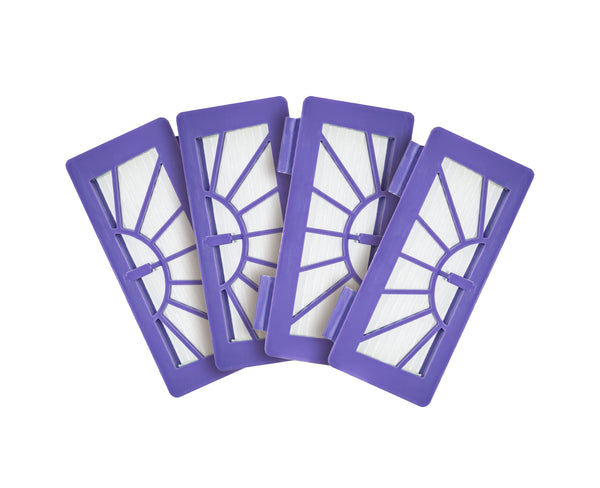
A vacuum cleaner helps clean your floors and can also be used to deep clean households of microscopic allergens like mold, bacteria, and dust mites. That is, given you are using the right one. Did you know that not all vacuum cleaners are capable of this? It's certainly not something that vacuum cleaner manufacturers are willing to advertise openly, but it's true! You'll need to use a vacuum with a HEPA filter to clean effectively without letting the fine particles escape.
The HEPA is a specialized filter required for trapping fine airborne particles, and not every vacuum cleaner uses them. Truthfully, it is simple to gauge whether your vacuum cleaner can perform this specialized function. All you need to do is ask: Does it use a HEPA filter, or not? This blog will guide you on picking a HEPA vacuum cleaner so you don't miss the fine particles.
HEPA Vacuum Filters
Most vacuum cleaners will use some type of filtration system, especially for the purpose of protecting the vacuum engine. You might know these filter types under other terms like "foam," "felt," "pre-motor," and "post-motor." However, although they are critical to the longevity of your vacuum cleaner, that is the only thing these filters are good for. For deep cleaning and fine particle removal, you must ensure that the vacuum cleaner uses a HEPA filter.
HEPA Filter Structure
The structure of a HEPA filter is calculated; the weave and tightness of the HEPA filter's fiberglass pleats make it capable of trapping fine particulates without being able to escape. Otherwise, you'll find that most fine particles will pass right through any average filter.
HEPA Filter Function
A HEPA vacuum filter captures and contains 99.97% of all particles that are 0.03 microns in diameter or larger. Simply put, if your vacuum cleaner doesn't use a HEPA filter, you will not be able to do an effective deep clean - no matter how much time or effort you put in.
So, what is the tangible difference between using a HEPA vacuum cleaner or a standard one? That can be measured!
Fine Particle Filtration
At the base level, any old vacuum cleaner that's worth something can easily pick up surface-level debris and large particles. These are elements you can see with your naked eyes, such as dust, lint, dirt, and pet hair.
As the particles go smaller (think mold spores, smoke, skin cells, etc.), what happens is that the powerful suction of the vacuum cleaner will siphon them into its compartment, maintaining control over many of the larger particles. However, the fine particles are too small to stay "trapped" in the compartment without an effective HEPA filter. They float around freely until they make their way through the exhaust system and eventually straight back into your breathing air.
Some of the finest particles are the most threatening ones. Here is a list of the smallest allergens within the ballpark of 0.03 microns which your HEPA vacuum will pick up, and your standard unit will miss out:
- Bacteria
- Smoke
- Dust mites
- Virus particles

HEPA Vacuum Maintenance
Replace the filter of a HEPA vacuum cleaner every few years or as needed. Check with the vacuum manufacturer for recommendations on replacement schedules.
Our Top Picks of HEPA Vacuum Cleaners
Not sure where to start? Here is a list of popular vacuum cleaner models that utilize HEPA filters:
- Bissell CrossWave Series
- Dyson V10 Series (V10 Animal, V10 Absolute, V10 Total Clean, etc.)
- Neato BotVac D Series Robotic Vacuum Cleaners
- Shark Navigator Series
- Aerus Electrolux Guardian Epic 8000/9000 Series

Does Your Vacuum Cleaner Use a HEPA Filter?
Every vacuum cleaner is different; some filters need to be replaced every few years, others every few months. Maybe your vacuum cleaner uses a HEPA filter, and you don't even realize it! If that's the case and you just found out, you should replace the filter immediately.
If you're unsure and need to find out, first you need to confirm the make and model of your vacuum cleaner. Call the manufacturer and ask them these two questions:
1. Does this vacuum cleaner use filters that need to be replaced?
2. If so, how often do the filters need to be replaced?
See if they mention HEPA filters. While you're on the phone with the manufacturer, you might as well ask how often they recommend replacing the filters.
Not every vacuum cleaner uses a HEPA filter, but you cannot do deep cleanings of fine particles without one. Don't be fooled; vacuum cleaner manufacturers won't advertise their product struggles to pick up bacteria and virus particles. The only thing you need to do is make sure you are using a HEPA vacuum cleaner. It's the best thing you can do for your allergies!








